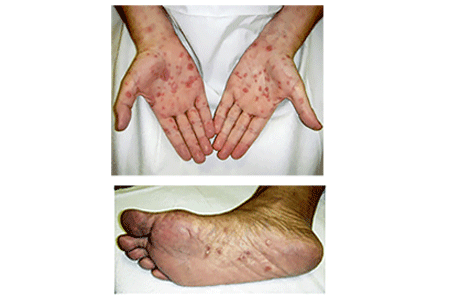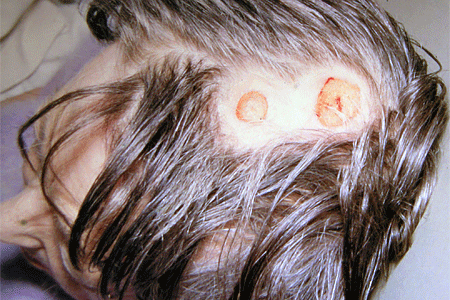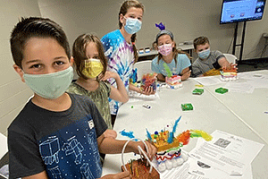Syphilis: Signs and symptoms
Syphilis is caused by a bacterial infection. Most people become infected during sex.
Without treatment, syphilis can progress through stages and can cause serious health problems. Here’s what you may notice during each stage.
Primary stage of syphilis
When it begins: The primary stage of syphilis begins 10 to 90 days after you become infected. Most people develop symptoms about 3 weeks after having sex with someone who has syphilis.
What you may notice: During this stage, you may have:
One or more open sores called chancres, which often feel firm and painless
Swollen lymph nodes
The open sores usually develop on the genitals, inside the mouth, or within the vagina or anus. Because these sores are often painless, many people never notice them.
These open sores usually heal and go away within 3 to 6 weeks. While the sores heal on their own, you still need treatment. Without treatment, syphilis can move to the next stage.
Are you contagious? Yes. Syphilis is very contagious during this stage. If you have sex (oral, anal, or vaginal), you can easily give your partner(s) syphilis.
While less common, you can give someone syphilis through kissing if you have open sores inside your mouth or on your lips.
Open sores
Where the bacteria that cause syphilis work their way into your body, you may develop open sores called chancres.

Secondary stage of syphilis
When it begins: The secondary stage of syphilis begins within 6 months of the syphilis sores going away. Some people enter this stage immediately after (or as) their sores clear.
What you may notice: As the disease spreads throughout your body, many signs and symptoms can develop. The most common are:
Rash (can appear on the skin in many ways and begin before the sores in first stage heal)
Sores on moist areas (genitals, inside the mouth, in the throat or anus)
Fever
Fatigue
Sore throat
Weakness
Hair loss
Weight loss
Swollen lymph nodes
If the disease spreads to your nervous system, you can develop other signs and symptoms, including:
Neck stiffness
Headaches
Hearing loss
Problems with your reflexes
Paralysis
The secondary stage lasts several weeks to several months. Once this stage ends, the signs and symptoms will go away.
While most signs and symptoms go away, this doesn’t mean the syphilis goes away. Without treatment, syphilis often moves to the next stage.
Are you contagious? Yes. Syphilis is very contagious during this stage. If you have sex (oral, anal, or genital), you can easily give your partner(s) syphilis.
While less common, you can give your partner syphilis through kissing if you have syphilis sores inside your mouth or on your lips.
Syphilis rash
A rash can develop anywhere, but it often appears on the palms and soles. It may cause spots, blisters, or many other signs.

Latent stage of syphilis
When it begins: The latent stage of syphilis begins after the rash and other signs and symptoms clear.
What you may notice: This stage is also called the “hidden stage” because you will not have any signs and symptoms.
Even without signs or symptoms, you can still have syphilis.
Without treatment, you may stay in the latent stage for the rest of your life. Some people relapse and go through the secondary stage again. If this happens, you’ll develop signs and symptoms again. You can go through the secondary stage two or more times.
Each time the secondary stage ends, you return to the latent stage.
Are you contagious? Yes. Even when you don’t have signs or symptoms, you can still give someone syphilis by having sex (oral, anal, or genital).
Symptoms disappear
In this stage, you don’t have signs or symptoms, but a blood test can still diagnose syphilis.

Tertiary stage
When it begins: Reaching the tertiary stage of syphilis usually takes many years. However, syphilis can progress quickly. Without treatment, some people reach this last stage within 1 year of getting syphilis.
What you may notice: This stage is also called the “destructive” stage because it can damage your organs. In this stage, you may develop:
Gummas, which are sores that can grow deep and eat away at the area (skin, lungs, liver, or bone) where they develop.
A condition called cardiovascular syphilis, which attacks your heart and blood vessels.
A condition called neurosyphilis, which attacks your nerves, spinal cord, and brain.
In this stage, syphilis becomes so destructive that it can cause death.
Even in this stage, treatment can stop the syphilis from getting worse. However, treatment cannot undo damage caused by syphilis.
Are you contagious? No
Gummas
The sores on this patient’s scalp are called gummas. This type of sore can grow deep, destroying even the bone beneath.

Syphilis can affect your eyes or nervous system at any stage
If the bacteria that cause syphilis get into your central nervous system, you can develop a condition called neurosyphilis.
Symptoms of neurosyphilis can include:
Headaches
Neck stiffness
Confusion
Ringing in the ears or hearing loss
Red, irritated eyes, blurry vision, or blindness
Stroke
Weakness
Dementia
Loss of balance
It is important to tell your doctor if you have any of these symptoms. Neurosyphilis requires special treatment to cure it. You may need tests like an eye exam or other tests to tell if you have neurosyphilis.
Syphilis can also affect your eyes at any stage. Signs that this has happened include having red, irritated eyes and problems seeing clearly. Some people go blind.
While anyone can get syphilis, some people have a higher risk. You can find out if you have a higher risk and how to prevent infection by going to:
Syphilis: Who gets it and causes
Images
Image 1,3: Getty Images
Image 2: Used with permission of the Journal of the American Academy of Dermatology: J Am Acad Dermatol. 2020;82:1-14.
Image 4: Used with permission of DermNet NZ.
References
Forrestel AK, Kovarik CL, et al. “Sexually acquired syphilis Historical aspects, microbiology, epidemiology, and clinical manifestations.” J Am Acad Dermatol 2020;82:1-14.
Stary G, Stary A. “Sexually transmitted infections.” In: Bolognia JL, et al. Dermatology. (fourth edition). Mosby Elsevier, China, 2018: 1447-59.
University of Michigan, School of Medicine. “Stages of syphilis.” Page last reviewed Sep 11, 2018. Last accessed Apr 3, 2020.
 Atopic dermatitis: More FDA-approved treatments
Atopic dermatitis: More FDA-approved treatments
 Biosimilars: 14 FAQs
Biosimilars: 14 FAQs
 How to trim your nails
How to trim your nails
 Relieve uncontrollably itchy skin
Relieve uncontrollably itchy skin
 Fade dark spots
Fade dark spots
 Untreatable razor bumps or acne?
Untreatable razor bumps or acne?
 Tattoo removal
Tattoo removal
 Scar treatment
Scar treatment
 Free materials to help raise skin cancer awareness
Free materials to help raise skin cancer awareness
 Dermatologist-approved lesson plans, activities you can use
Dermatologist-approved lesson plans, activities you can use
 Find a Dermatologist
Find a Dermatologist
 What is a dermatologist?
What is a dermatologist?